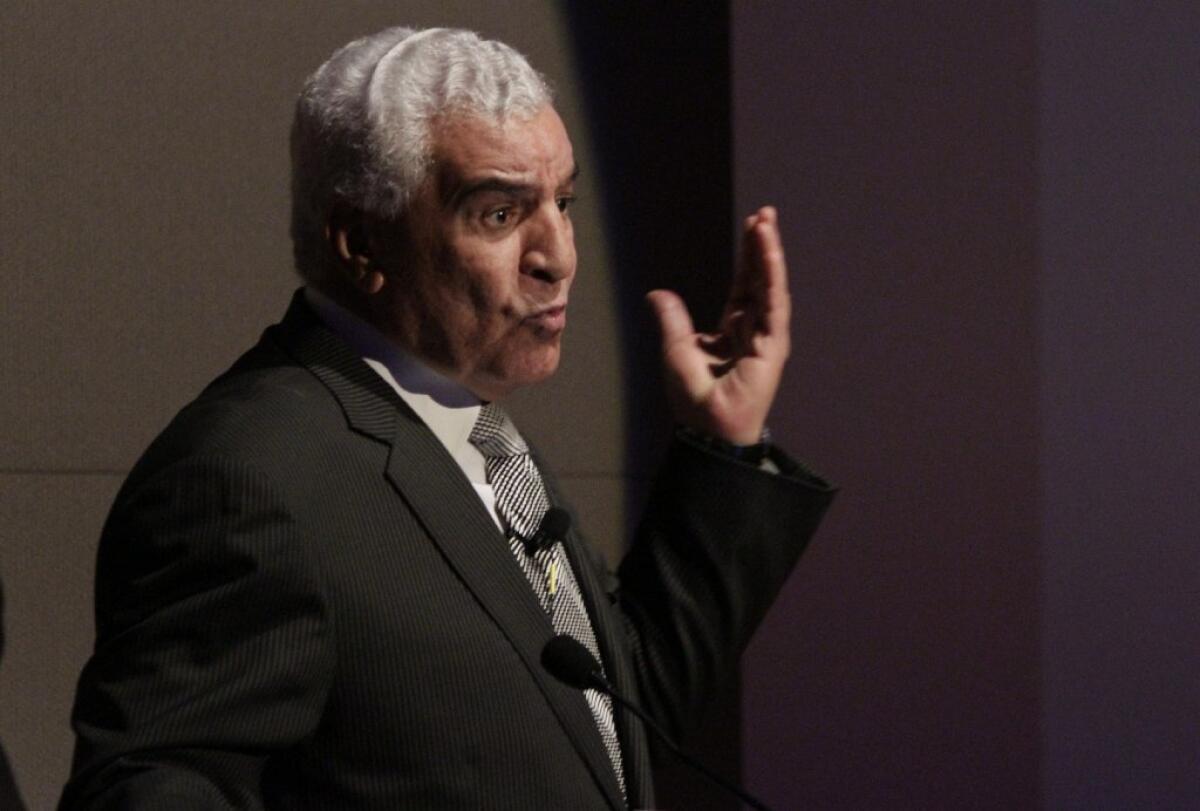Zahi Hawass urges military action to save Iraq’s ancient sites

- Share via
If it were up to Zahi Hawass, international boots would be on the ground in Iraq, assigned to guard or rescue winged divinities and other relics of ancient Sumeria, Assyria and Babylon that have fallen in harm’s way because of the religious fanaticism of Islamic State.
Hawass, the flamboyant former chief of antiquities in Egypt, is known for taking — his critics would say hogging — the spotlight in television specials about mummies, pyramids and King Tut.
Now he says it’s urgent that he and other lovers of the ancient past try to seize the spotlight on behalf of civilizations that sometimes were adversaries of his beloved Pharaohs but whose endangered relics are similarly crucial to the world’s cultural patrimony.
Saving ancient sites “needs to be a priority, it needs to be the first thing” in the struggle against Islamic State, Hawass said before lecturing this week at USC. “I receive emails all the time from young archaeologists in these countries, and they are afraid. We can’t wait, we can’t leave them to destroy our history.”
Recent reports and a video released by Islamic State indicate that the insurgency, also known as ISIS or ISIL, has sacked the Mosul Museum and destroyed Nimrud and Hatra, two ancient sites in northern Iraq. The fundamentalist group aims to establish religious rule across the Middle East and regards remnants of the region’s pagan ancient civilizations as an affront to Islam.
While destroying archaeological sites, Islamic State also is suspected of treating some of the more portable ancient loot under its control as unwanted but valuable assets to be liquidated on the black market through sales to unscrupulous antiquities collectors.
Given the impunity Islamic State has often enjoyed in seizing territory and committing mass slaughter of religious minorities, stopping it from destroying ancient art and architecture would be a tall order.
In the interview, Hawass seemed to be brainstorming possibilities rather than articulating any firm proposal that could be taken to the United Nations, the White House or other world capitals.
He wishes the Arab League could muster a special military force whose mission would be defending ancient sites and museums.
“If the Arab people do that, they will be respected in every place all over the world,” Hawass said, adding that nothing will happen without leadership from the United States.
One thing the U.S. could do immediately, he said, would be to step up training for customs inspectors in other countries to improve their chances of intercepting smuggled Middle Eastern antiquities.
Hawass said he hopes other voices will chime in for an organized strategy to save the ancient past of Iraq, as well as Syria and Libya.
“The only way to do that is to talk to the media,” he said, “so Americans can be aware of this and want to do something. If Americans will think of a strategy, with the Arab world, to stop what’s happening, they can.”
And if not?
“Then this will be a disaster for all of us.”
Hawass lost his longtime government post in Egypt when the Muslim Brotherhood came to power in 2012. He speaks now as a private citizen with a public function — hitting the lecture circuit as a consultant to Egypt’s ministry of tourism. Besides sowing enchantment for all things Pharaonic, Hawass aims to reassure audiences that it’s safe again to visit Egypt after upheaval that began in 2011 with protests that toppled the authoritarian government of President Hosni Mubarak.
Hawass, whose career had prospered under Mubarak, faced corruption charges after the election of Mubarak’s successor, Mohamed Morsi. They were dropped after the Muslim Brotherhood leader was deposed in a military coup that led to the current regime headed by President Abdel Fattah Sisi.
Follow https://twitter.com/boehmm of the LA Times for arts news and features
More to Read
The biggest entertainment stories
Get our big stories about Hollywood, film, television, music, arts, culture and more right in your inbox as soon as they publish.
You may occasionally receive promotional content from the Los Angeles Times.











